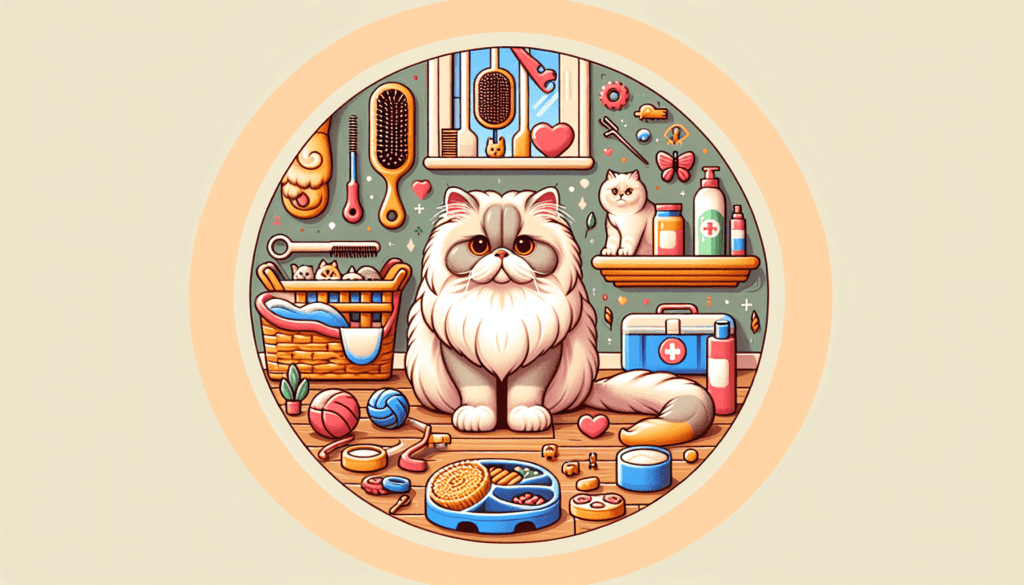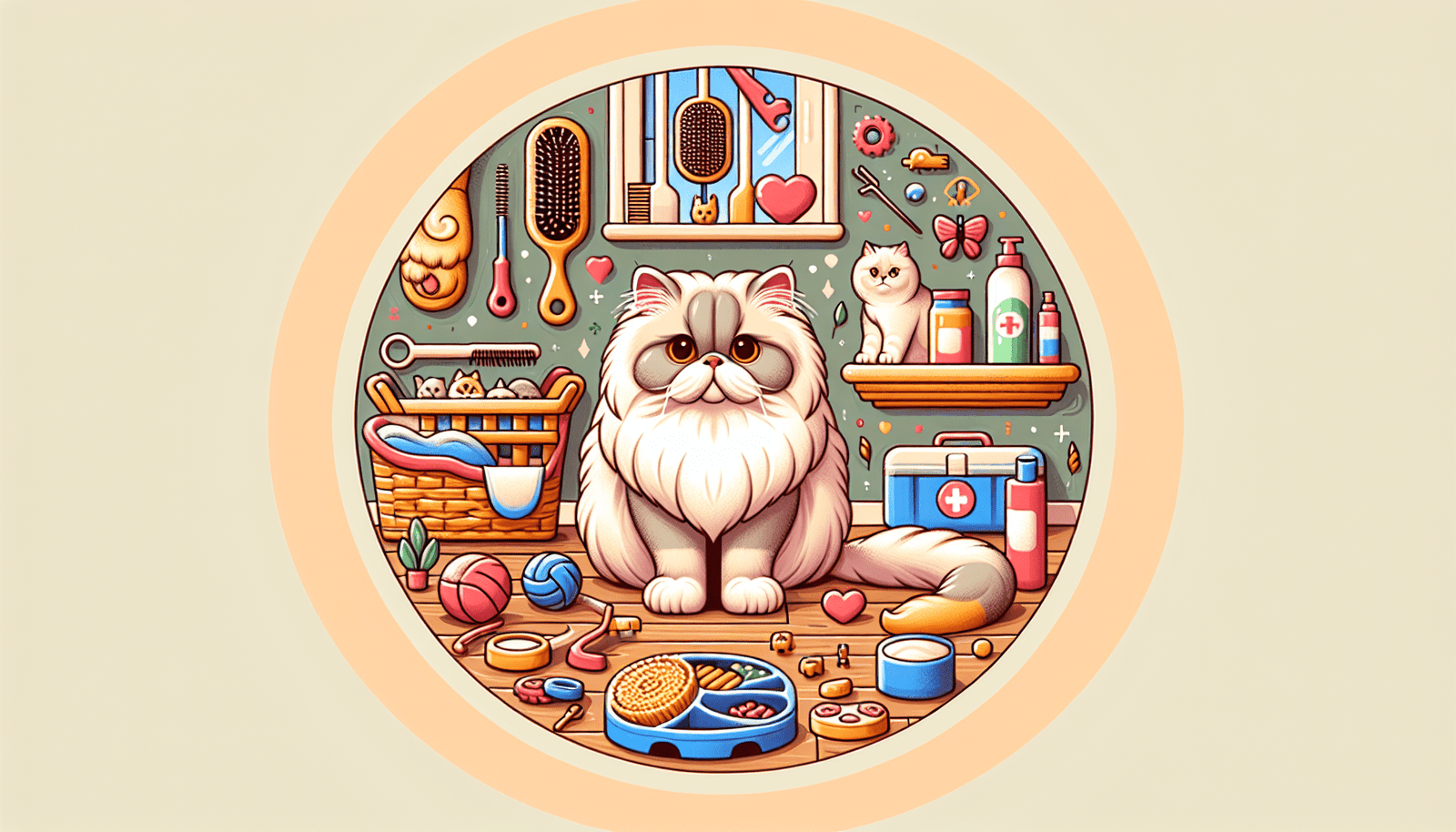If you’re lucky enough to have a Persian cat in your life, you know that these regal felines require special care and attention. From their luxurious coats to their unique personalities, Persian cats are a breed apart. In this article, we’ll explore some essential tips on how to provide the best care for your Persian cat, ensuring their happiness and well-being. From grooming to diet and exercise, we’ve got you covered. So, grab your furry friend and let’s embark on a journey of feline care and companionship!

Grooming
Brushing their fur regularly
Taking care of your Persian cat begins with regular grooming, especially when it comes to their luxurious fur. Persian cats have long, silky coats that require frequent brushing to prevent matting and tangles. Set aside a dedicated grooming time each day to spend with your feline friend. Gently brush their fur using a soft-bristled brush or a specialized cat brush. This not only keeps their coat looking beautiful but also helps to remove loose hairs and prevent the formation of hairballs.
Bathing your Persian cat
While Persian cats are known for their cleanliness and their ability to groom themselves, occasional baths are necessary to keep them looking and feeling their best. Fill a basin or sink with warm water and use a cat-friendly shampoo to gently wash your Persian’s fur. Make sure to rinse thoroughly to remove any residue. It’s important to be gentle and patient during this process, as Persian cats can be sensitive to water and bathing. Remember to dry them thoroughly with a towel or a low heat setting on a hairdryer to prevent them from catching a chill.
Cleaning their eyes and ears
Persian cats have large, round eyes that are prone to tear staining and eye discharge. To keep their eyes clean and healthy, use a soft, damp cloth to gently wipe away any gunk or tears that may accumulate around their eyes. Be careful not to apply too much pressure or use any harsh chemicals, as this can irritate their delicate eye area. Additionally, clean their ears regularly by using a cat-friendly ear-cleaning solution and a cotton ball. Gently swab the visible parts of the ear, being cautious not to insert anything into the ear canal. Clean ears help prevent infections and ensure your Persian cat stays comfortable and happy.
Feeding
Providing a balanced diet
To keep your Persian cat in optimal health, it’s essential to provide them with a balanced diet. Opt for high-quality cat food that is specially formulated for Persian cats. This ensures they receive the right mix of essential nutrients, vitamins, and minerals to support their unique needs. Consult with your veterinarian to determine the appropriate portion sizes based on your cat’s age, weight, and activity level. Remember to monitor their weight and adjust their diet accordingly to prevent obesity, which can lead to various health issues.
Feeding a mix of wet and dry food
While dry cat food provides essential nutrients and aids in dental health by promoting chewing, wet cat food offers additional hydration and can be more palatable for your Persian cat. Consider feeding a combination of both wet and dry food to meet their dietary requirements and keep them well-hydrated. Mixing the two types of food also adds variety to their meals, making mealtime more enjoyable for your feline companion.
Avoiding toxic foods
It’s crucial to be aware of foods that are toxic to cats and ensure these are never offered to your Persian. Some common toxic foods for cats include chocolate, onions, garlic, grapes, raisins, caffeine, alcohol, and artificial sweeteners like xylitol. These substances can cause severe health issues and, in some cases, even prove fatal to your beloved pet. Always double-check the ingredients of any treats or foods you plan to give your Persian cat to keep them safe and healthy.
Hydration
Providing fresh water at all times
Ensuring your Persian cat remains hydrated is essential for their overall health and well-being. Make sure to provide fresh, clean water at all times. Cats can be fussy drinkers, and some prefer running water over still water. Consider using a water fountain specifically designed for cats that provides a continuous flow of fresh water. This can entice them to drink more and prevent dehydration, especially if they are not fans of drinking from a traditional bowl.
Using water fountains
Persian cats have long, luxurious coats that require proper hydration for optimal coat health. Drinking enough water helps maintain their coat’s condition, preventing dryness and minimizing the risk of matting. Water fountains not only entice your Persian to drink more but also ensure the water remains clean and oxygenated. Additionally, the sound of running water can be soothing for many cats, so a water fountain may act as a source of relaxation for your feline friend.
Ensuring proper hydration for a healthy coat
Proper hydration is vital for maintaining a healthy coat in Persian cats. A dehydrated cat may experience dry skin, which can lead to itchiness and dull fur. By providing ample fresh water and using water fountains, you can encourage your Persian to stay hydrated, promoting a shiny, lustrous coat. Keep an eye on their water intake and consult your veterinarian if you notice any significant changes, as it could be a sign of an underlying health issue.
Litter Box
Keeping the litter box clean
A clean litter box is essential for your Persian cat’s comfort and overall hygiene. Persian cats are particular about cleanliness, and maintaining a pristine litter box is crucial to encourage proper litter box usage. Scoop the litter box daily to remove any clumps or waste and make sure to completely change the litter on a regular basis. This not only prevents any unpleasant smells but also helps to prevent infections or litter box aversion.
Choosing the right litter
When it comes to choosing the right litter for your Persian cat, consider their preferences as well as their specific needs. Persian cats often prefer fine-grained, unscented litter that is gentle on their paws. Avoid using litters with strong fragrances, as these can be overwhelming for their sensitive noses. Experiment with different types of litter to find the one that your Persian cat finds most comfortable and appealing.
Placing multiple litter boxes in your home
Persian cats are known for their love of cleanliness, and having multiple litter boxes throughout your home can help meet their needs. Having more than one litter box prevents them from feeling anxious or overwhelmed, especially in larger homes or multi-story residences. Place the litter boxes in quiet and accessible areas where your Persian can have some privacy and choose the location carefully to avoid any major changes that may disrupt their litter box routine.

Healthcare
Regular veterinary check-ups
Regular veterinary check-ups are vital to maintaining your Persian cat’s health and preventing potential health issues. Schedule routine visits with your veterinarian for comprehensive examinations, vaccinations, and any necessary preventive treatments. These check-ups allow your vet to monitor your cat’s overall well-being, address any concerns, and ensure your Persian receives the necessary care to live a long and healthy life.
Vaccinations and preventives
Keeping your Persian cat up to date with vaccinations and preventives is crucial for their well-being. Consult with your veterinarian to determine the appropriate vaccination schedule for your cat. Vaccines protect against various diseases, including rabies, feline leukemia, and respiratory infections. Additionally, preventive treatments for fleas, ticks, and worms should be administered regularly to keep your Persian cat free from parasites and potential health complications.
Addressing potential health issues promptly
It’s important to closely monitor your Persian cat for any signs of illness or discomfort and seek veterinary care promptly if needed. Persian cats can be prone to certain health issues, including polycystic kidney disease, hypertrophic cardiomyopathy, and respiratory problems due to their unique facial structure. Familiarize yourself with the common health concerns for Persian cats and be proactive in addressing any potential issues to ensure your furry friend is healthy and happy.
Exercise and Play
Providing interactive toys
Although Persian cats are generally known for their calm and relaxed demeanor, they still require regular exercise to maintain a healthy weight and stimulation. Provide your Persian with a variety of interactive toys that encourage physical activity and mental engagement. Toys that simulate hunting behavior or allow them to chase and pounce on objects can be particularly appealing to your furry companion.
Engaging in regular play sessions
To ensure your Persian cat gets enough exercise, set aside dedicated playtime each day. Engage in interactive play sessions using toys or even simple objects like feathers or strings. Use a variety of movements to mimic prey, encouraging your Persian to engage in a playful chase. This not only provides physical exercise but also strengthens your bond and provides mental stimulation for your feline friend.
Creating a stimulating environment
Persian cats thrive in an environment that offers mental and physical stimulation. Create a stimulating and enriched environment by providing scratching posts, climbing trees, and perches for your Persian to explore and enjoy. Rotate their toys regularly to avoid boredom and provide them with hiding spots or paper bags to fulfill their natural curiosity. By creating a stimulating environment, you can keep your Persian cat entertained and prevent behavioral issues that may arise from boredom.
Scratching Posts
Providing appropriate scratching surfaces
Scratching is a natural behavior for cats, including Persian cats, and it’s important to provide appropriate scratching surfaces to fulfill this instinct. Invest in sturdy scratching posts or boards covered in a suitable material like sisal or cardboard. Place the scratching posts in areas where your Persian spends most of their time or near their favorite resting spots. Encourage your cat to use the scratching posts by gently guiding them with their front paws and praising them when they scratch in the appropriate areas.
Using catnip or pheromones
To entice your Persian cat to use the scratching post, you can enhance their interest by using catnip or synthetic pheromones. Catnip is a herb that many cats find irresistible, and it can help attract them to the scratching post. Rub or sprinkle catnip onto the scratching surface, making it more appealing to your Persian. If your cat doesn’t respond to catnip, synthetic pheromones, such as Feliway, can be used to create a calming and positive association with the scratching post.
Training your Persian cat to use the post
Training your Persian cat to use a scratching post is important to protect your furniture and maintain their healthy scratching behavior. Whenever you catch your cat scratching an inappropriate surface, gently redirect them to the designated scratching post. Use positive reinforcement by praising and rewarding your cat when they scratch the post. Consistency and patience are key during this training process, and with time, your Persian will learn to associate the scratching post with a positive experience.
Environmental Enrichment
Creating vertical spaces
Persian cats love to explore their surroundings from higher vantage points. Consider creating vertical spaces by providing cat trees, shelves, or perches for your Persian to climb and observe their environment. Vertical spaces not only offer mental stimulation but also give your cat a sense of security and territory. Ensure these spaces are sturdy and safely secured to prevent accidents or injuries.
Offering hiding spots and cozy beds
Providing hiding spots and cozy beds is essential for a Persian cat to feel safe and secure in their environment. Persian cats often enjoy retreating to quieter areas where they can have some alone time. Offer cozy beds or blankets in secluded corners or provide cat caves or covered hiding spots that give your Persian a sense of privacy and security. These spaces become their retreat when they need a break from the hustle and bustle of everyday life.
Giving access to windows
Persian cats are known for their love of sunbathing and observing the world outside. Ensure your Persian has access to windows where they can enjoy natural sunlight and observe their surroundings. Consider creating elevated perches or installing window shelves to provide a comfortable spot for them to relax and enjoy the view. Just be sure to secure the windows to prevent any accidents or escapes.
Safety
Securing windows and balconies
Keeping your Persian cat safe should always be a priority. If you live in an apartment or have access to balconies or open windows, make sure they are securely screened or enclosed to prevent any potential falls or accidents. Persian cats may be curious, and it’s important to take precautions to ensure their safety, especially if they have never been exposed to outdoor environments.
Keeping hazardous substances out of reach
Ensure that any household cleaning products, chemicals, or hazardous substances are stored securely and out of your Persian cat’s reach. Cats are known for their curiosity, and ingesting toxic substances can be extremely dangerous and even fatal. Keep these items locked away in cabinets or storage areas to prevent accidental ingestion or exposure.
Preventing access to small objects
Persian cats are known for their luxurious coats, which can sometimes lead to hairballs. To minimize the risk of hairballs and prevent choking hazards, keep small objects such as rubber bands, hair ties, or small toys out of your Persian cat’s reach. These items can pose a serious threat if accidentally ingested. Regularly check your home for any potential hazards and remove or secure them to ensure a safe environment for your Persian.
Stress Management
Maintaining a calm environment
Persian cats thrive in a calm and peaceful environment. Avoid loud noises, sudden changes, or excessive commotion that can cause stress or anxiety for your feline companion. Maintain a consistent routine and provide a quiet space where your Persian can retreat and relax if they need some alone time. By creating a calm environment, you can help reduce stress and promote your cat’s overall well-being.
Using pheromone diffusers
Pheromone diffusers, such as Feliway, can be beneficial in creating a calming atmosphere for your Persian cat. These diffusers release synthetic pheromones that mimic the comforting scent produced by cats. By dispersing these pheromones throughout your home, you can help alleviate stress and anxiety in your Persian. This can be particularly helpful during periods of change or when introducing your cat to new environments or situations.
Providing a safe retreat for alone time
Persian cats appreciate having a safe retreat where they can retreat and have some alone time. Create a designated space in your home, such as a cozy corner, cat bed, or a specific room, where your Persian can retreat when they feel overwhelmed or in need of solitude. Make sure this space is quiet, comfortable, and free from any disturbances. Respect their need for alone time and allow them to recharge and relax in their safe retreat.

